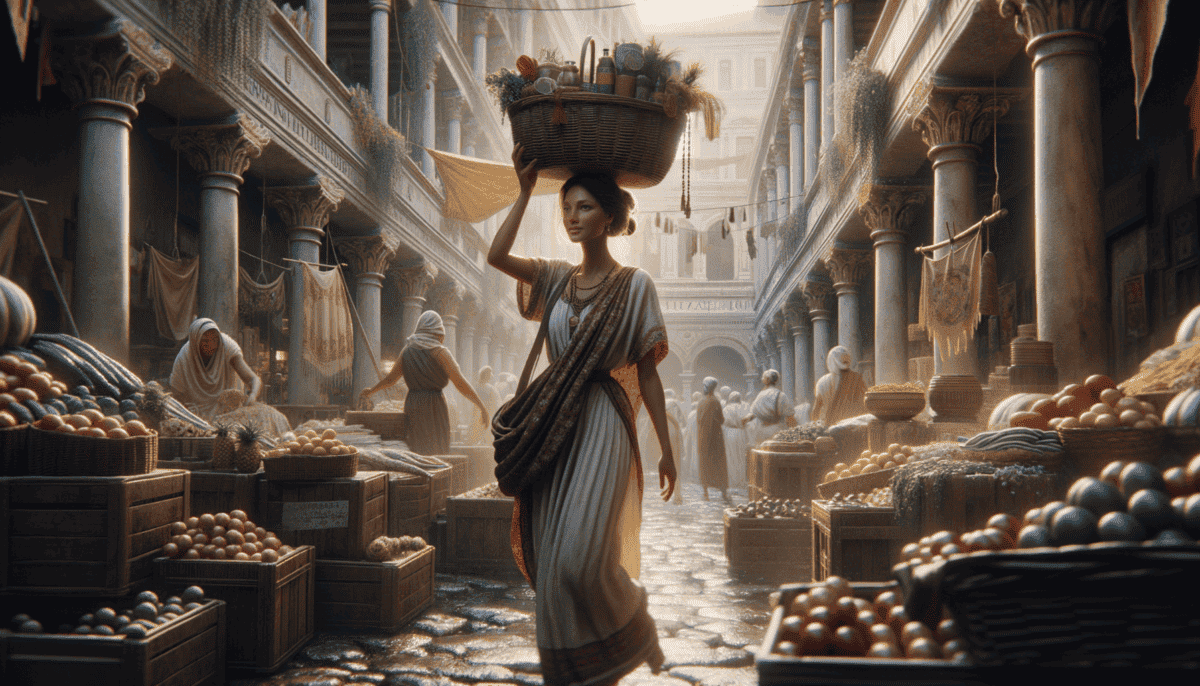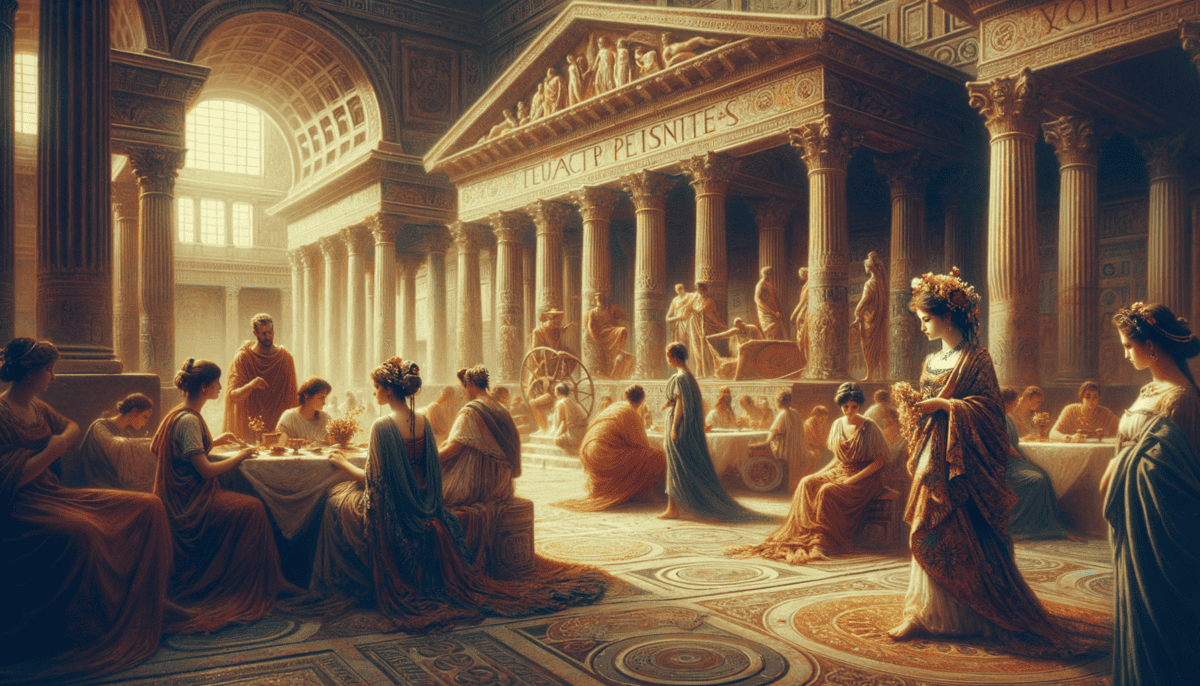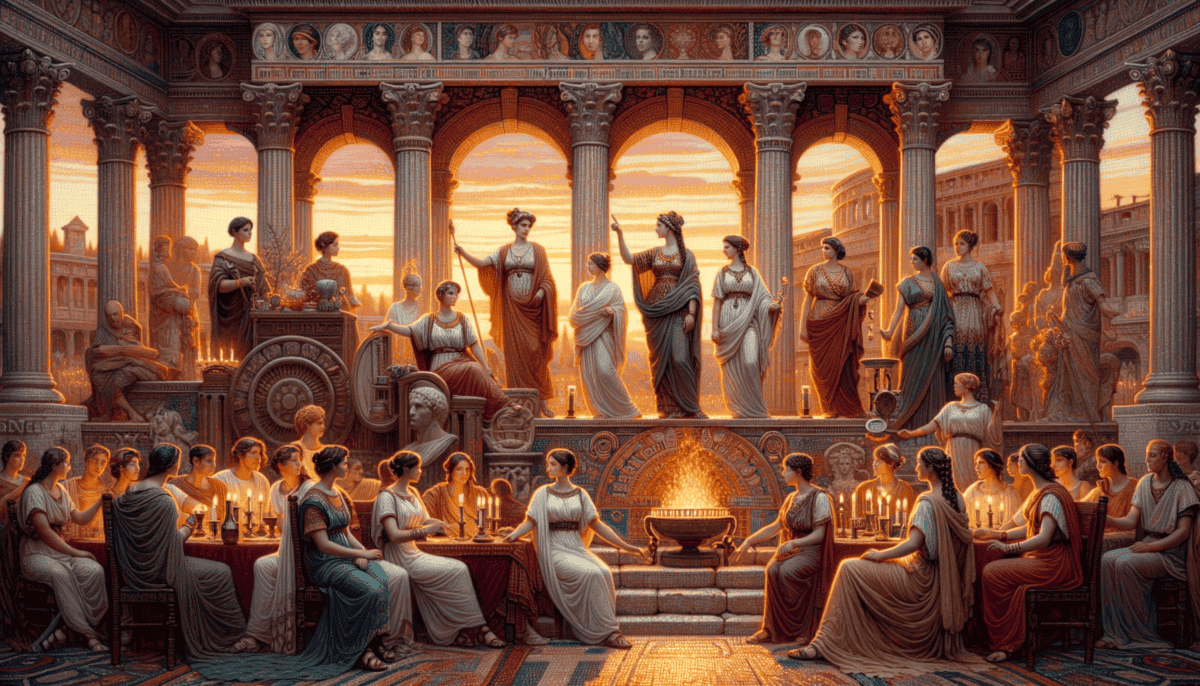Shadows of the Patrician House
Julia stood at her bedroom window, watching the sunrise paint the marble columns of her family's villa in soft gold. The sweet smell of olive blossoms drifted up from the garden below. She was thirteen now – old enough to know that her life was about to change forever.
"Julia!" Her mother's voice echoed through the atrium. "Come down at once. The hairdresser is here!"
Julia sighed and touched her long dark hair. She knew what that meant. Today was her engagement party.
️ Rome, 120 CE
The house was already buzzing with activity. Servants rushed past carrying platters of figs and honey cakes. Julia's mother, Cornelia, stood in the center of it all like a ship's captain in a storm.
"Stand still," Cornelia commanded as the hairdresser began arranging Julia's hair into the elaborate style worn by proper Roman ladies. "You must look perfect today. The Claudius family will be watching."
Julia tried not to fidget as pins scratched her scalp. "But Mother, I've never even met Marcus Claudius. How can I marry someone I don't know?"
Cornelia's expression softened for a moment. "That's how it works for patrician women like us, dear one. Your father has chosen well. The Claudius family is very powerful."
• Married very young (12-14 years old)
• Had no choice in their husband
• Expected to run a household
• Must always obey their father
Later that morning, Julia sat in the garden with her best friend Lucia, who lived next door.
"At least you get to stay in Rome," Lucia said, weaving flowers into a crown. "My father says I'll probably marry someone from the provinces."
"But don't you want to choose for yourself?" Julia asked. "Like the merchant women in the forum who run their own shops?"
Lucia shook her head. "We're patricians, Julia. We have to maintain the dignity of our class. Besides, those women have to work. We get to live in beautiful houses and wear silk."
Julia looked down at her expensive dress, imported all the way from China. She knew she was lucky in many ways. But sometimes the silk felt like chains.
The party began at sunset. Torches blazed in the courtyard as Rome's noble families arrived in their finest clothes. Julia stood beside her father, trying to smile as guest after guest congratulated them.
Then she saw him – Marcus Claudius, her future husband. He was much older than she expected, at least thirty. He barely glanced at her as he discussed business with her father.
"Remember," her mother whispered, "a patrician woman's duty is to her family's honor. You'll learn to be content, as I did."
That night, Julia couldn't sleep. She crept out to the garden and sat by the fountain, listening to the water splash. Above her, the stars wheeled in their ancient patterns, unchanging as the laws that governed her life.
But as she watched a shooting star streak across the sky, Julia made a silent promise to herself. She would find ways to shape her own destiny, even within the gilded cage of patrician life. Other Roman women had done it before her – she had heard whispered stories of those who wielded quiet influence behind the scenes.
Tomorrow she would begin learning everything she could about running a great household. Knowledge, she was beginning to understand, was its own kind of power. And if she couldn't choose her path, she would at least walk it with her head held high.
The moon cast her shadow on the marble tiles – the shadow of a girl becoming a woman in ancient Rome, where destiny was determined by birth but character was shaped by choice.
The Marketplace of Survival
The morning sun had barely touched the crowded streets of Rome’s Subura district when Claudia grabbed her market basket. Her young daughter Flora rubbed sleepy eyes beside her.
“Come, little one,” Claudia said. “We must get to the market early to find the best deals.”
They lived in a tiny apartment above a noisy bakery. The rent was cheap because the smoke from the ovens below made their eyes water. But Claudia was grateful – many families had it worse.
• Woke before sunrise
• Worked long hours
• Shopped in crowded markets
• Made their own clothes
• Cooked all meals from scratch
The streets were already filling with people as they hurried toward the marketplace. Claudia held Flora’s hand tight. “Watch how I bargain,” she told her daughter. “You’ll need to know this someday.”
At the vegetable stand, Claudia picked up a cabbage. “Three copper coins?” she exclaimed to the seller. “Yesterday it was two!”
“Times are hard,” the old woman replied with a shrug. “Even the emperor can’t control food prices these days.”
Claudia thought of the single coin in her purse. Since her husband died last winter, every copper piece mattered. She sold hand-sewn clothes to help make ends meet.
“Two coins,” Claudia countered firmly, “and I’ll buy two cabbages plus those slightly bruised apples.”
The seller smiled. “You drive a hard bargain, Claudia. Deal.”
Flora watched wide-eyed as her mother carefully counted out the coins. “How did you do that, Mama?”
“By being smart and strong,” Claudia replied. “That’s how women like us survive.”
They passed a group of patrician ladies being carried in fancy chairs. Flora stared at their silk dresses and jeweled hair pins.
“Why can’t we live in a big house like them?” she asked.
Claudia squeezed her daughter’s hand. “We may not have fancy things, but we have something better – freedom to make our own way. Those ladies can’t even leave their homes without permission.”
At the wool merchant’s stall, Claudia traded some of her sewing work for fresh yarn. She had regular customers now who valued her fine stitching.
“Your work gets better every time,” the merchant said. “Have you thought about opening your own shop?”
Claudia paused. She had been saving coins, hiding them in a jar under a loose floorboard. Maybe someday…
The afternoon grew hot as they headed home. They stopped at the public fountain where women gathered to get water and share news.
“Did you hear?” her friend Lucia whispered. “The baker’s wife on Via Sacra is selling her shop. Her husband died and she has no sons.”
Claudia’s heart beat faster. The jar of coins under her floor suddenly felt heavier with possibility.
That evening, as she helped Flora practice her letters by lamplight, Claudia made plans. Other women ran successful businesses in Rome – why not her? She might not have been born to wealth like the patricians, but she had something they didn’t: the freedom to try.
“What are you thinking about, Mama?” Flora asked, seeing her mother’s distant smile.
“About tomorrow,” Claudia replied. “And all the tomorrows after that.” She hugged her daughter close. “Remember this, little one – we common women may not have much, but we are strong. We find ways to build our own dreams.”
Through their small window, the stars winked down on mother and daughter. In the distance, temples and palaces rose against the night sky. But here in the humble Subura, another kind of power was growing – the quiet strength of women who refused to let poverty define their destiny.
Sacred Duty
The temple flames danced before Lucia’s eyes as she knelt in prayer. At just sixteen, she was the newest Vestal Virgin, chosen to serve Rome’s most sacred fire.
“Remember,” her fellow Vestal, Marina, whispered. “The fate of Rome rests in our hands. If this fire dies, our city’s blessing dies with it.”
The marble halls echoed with their soft footsteps. Unlike other Roman women, the six Vestal Virgins lived free from male control. They answered only to the gods.
• Could own property
• Made their own choices
• Walked with guards
• Sat with senators at games
• Could free slaves with one word
“Look,” Marina pointed through the temple window. “The emperor himself bows to us.”
Sure enough, Emperor Hadrian was climbing the temple steps. Even he had to show respect to Rome’s holy women.
Lucia remembered the day she was chosen. She had been playing in her family’s garden when the chief priest arrived. “Your daughter has been selected,” he told her parents. “It is the highest honor.”
Now, her simple white robes marked her as special. People moved aside when she walked through Rome’s crowded streets. But the power came with a price – thirty years of perfect service. One mistake could mean death.
“Is it worth it?” she had asked Marina once. “Giving up marriage and family?”
“We serve something greater,” Marina answered. “We keep Rome’s heart beating.”
Today, a woman waited in the temple courtyard. Her eyes were red from crying.
“Please,” she begged Lucia. “My husband was wrongly accused of theft. Only a Vestal’s word can save him.”
Lucia’s heart jumped. She had the power to help, but was this woman telling the truth?
She closed her eyes, remembering her training. “Tell me everything,” she said.
As the woman spoke, Lucia felt the sacred flame’s warmth behind her. This was why the gods chose Vestals – to bring justice and mercy to Rome.
Later that night, as she tended the eternal flame, Lucia thought about power. Not the loud power of swords and senators, but the quiet power of women who served truth.
“The flame is dancing tonight,” Marina said, joining her. “The gods are pleased with you.”
Lucia smiled. She had spoken for the innocent man, and he was freed. Her word, backed by sacred duty, had changed a life.
A cool breeze swept through the temple. Outside, Rome slept under starlight. But here, the Vestals kept their endless watch, guardians of a power older than emperors.
“Tomorrow, you’ll lead the morning prayers,” Marina said.
Lucia nodded, no longer afraid. She had found her place – not in a husband’s home, but in this sacred space where women’s voices rang clear and strong.
The flame flickered, casting shadows on ancient walls. In its light, Lucia saw her future stretching out like a golden thread – thirty years of purpose, power, and peace.
She straightened her white veil and reached for the sacred tools. There were prayers to prepare, justice to uphold, and a sacred fire that must never die. This was her destiny, and she embraced it with all her heart.
Hearts in Chains
Aemilia stared at her reflection in the polished bronze mirror. Today was her wedding day, but joy wasn’t what made her hands shake. She was only fourteen.
“Hold still,” her mother said, pinning the flame-colored veil. “Marcus comes from a good family. This match will help your father’s business.”
But Aemilia had seen Marcus at the forum. He was thirty years older and had already buried two wives.
• Girls married as young as 12
• Had no choice in husband
• Marriage was for family alliances
• Wives had to obey husbands
• Could only divorce with father’s help
“But Mama,” Aemilia whispered, “I want to be like Cousin Flavia. She never married.”
Her mother’s face softened. “Flavia had a big dowry. She could choose her path. We don’t have that choice.”
Across town, another bride prepared for her wedding. But Livia was different. At twenty, she had already been married once and won her freedom through divorce.
“The law says I must marry again,” Livia told her friend Claudia. “But this time, I made my own match.”
“How did you convince your father?” Claudia asked.
“I learned to read,” Livia smiled. “I studied the laws. Knowledge is power.”
Back in Aemilia’s room, tears splashed on her wedding dress. Then she heard a commotion outside.
It was Livia, striding through the courtyard like a queen. “Stop this wedding,” she announced. “I have proof Marcus is already promised to another.”
Aemilia’s father turned red. “Who dares—”
“I dare,” Livia said, pulling out a scroll. “And the law dares. See for yourself.”
The wedding was canceled. That night, Aemilia hugged her rescuer. “Teach me,” she begged. “Teach me to be strong like you.”
Livia smiled. “First lesson: marriage isn’t a chain unless you believe it is. Even in Rome, a clever woman can find her way.”
Over the next months, Aemilia studied with Livia. She learned about laws, contracts, and the power of words.
“Your father has chosen another husband,” her mother announced one day.
But this time, Aemilia was ready. “Tell me about him,” she said calmly. “And show me the marriage contract.”
Her mother blinked in surprise. This wasn’t the same scared girl from before.
“Remember,” Livia had taught her, “marriage can be a door, not a cage. Choose wisely, negotiate carefully, and never forget your worth.”
The new suitor was younger, kinder. Aemilia met him in the garden, chaperoned but confident. She spoke of poetry, of business, of life.
“You’re not what I expected,” he said, smiling.
“Good,” Aemilia replied. “Because I’m not the bride you thought you were getting. I’m more.”
That evening, Livia visited again. “Well?” she asked.
“I’ll marry him,” Aemilia said. “But on my terms. The contract will include my right to read, to own property, to have a voice.”
Livia nodded proudly. Another Roman girl had learned to fly within her cage.
As the sun set over Rome’s seven hills, two women sat in the garden, planning and dreaming. The old ways were strong, but so were they. And sometimes, the quietest rebellions changed the most hearts.
Whispers of Empire
The marble halls of the imperial palace echoed with Livia’s footsteps. At forty years old, she was now Rome’s most powerful woman. But power came with shadows.
“My lady,” a servant whispered, “the Emperor Augustus is asking for you.”
Livia smoothed her stola and lifted her chin. She had learned long ago that true power wasn’t in shouting, but in quiet words.
• Listen more than you speak
• Make friends with everyone
• Keep secrets
• Help others quietly
• Stay calm when others yell
“Wife,” Augustus greeted her. “The Senate troubles me. They fight about the new tax law.”
Livia poured his wine, adding honey just as he liked. “Tell me more, husband.”
As Augustus talked, Livia remembered her early days in Rome. She had been just sixteen when she first married. Now she helped rule an empire.
“The servants say you visit the poor,” Augustus said suddenly. “Why?”
“Because everyone has value,” Livia answered. “Even the smallest bee helps make honey.”
Later that day, Livia met with her friend Claudia in the garden.
“The emperor listens to you,” Claudia marveled.
“He listens because I first listened to others,” Livia explained. “Power isn’t just about giving orders. It’s about understanding people.”
A young girl ran up to them. It was Julia, Augustus’s daughter, now twelve.
“Teach me,” Julia begged. “Father says I must marry soon. I want to be strong like you.”
Livia took Julia’s hand. “First lesson: a woman’s strength isn’t in her voice, but in her mind.”
That evening, as the sun painted Rome’s hills gold, Livia walked through the city streets. Women bowed and smiled. They knew she helped them quietly – finding jobs, feeding families, teaching their daughters to read.
“My lady,” called a familiar voice. It was Aemilia, now happily married. “Thank you for showing me the way.”
Livia hugged her young friend. “And now you show others. That’s how we change Rome – one woman at a time.”
Back at the palace, Augustus waited with more problems. But Livia smiled. She had built her own quiet empire of friends and helpers.
“The Senate agreed to your idea,” Augustus told her proudly.
“Our idea, husband,” Livia corrected gently. “Remember, Rome is strongest when we work together.”
That night, Livia wrote in her secret diary. “Power isn’t about being seen,” she wrote. “It’s about helping others find their strength.”
A soft knock came at her door. More women needed her help. More secrets to keep. More quiet changes to make.
Livia stood, ready to help. In the shadows of empire, she had built something stronger than marble – a network of women who knew their worth.
The moon rose over Rome, silver as a coin. Tomorrow would bring new challenges. But Livia wasn’t worried. She had learned the greatest power often came wrapped in whispers and wrapped in kindness.
Threads of Legacy
The sun rose over Rome’s seven hills, painting the city in gold. Livia stood at her window, watching the city wake up. Twenty years had passed since she first learned to use her quiet power.
Julia, now a grown woman, rushed into the room. “Mother Livia! The women are gathering in the garden.”
Below, Livia saw them all – the faces she had helped through the years. Claudia from the marketplace, her shop now the biggest in Rome. Aemilia teaching young girls to read. Even a Vestal Virgin, her white robes gleaming.
• Market sellers sharing food
• Teachers spreading knowledge
• Healers helping the sick
• Friends supporting friends
• Leaders training leaders
“Remember when you first taught me about power?” Julia asked, squeezing Livia’s hand.
“Yes,” Livia smiled. “And now you teach others.”
In the garden, women gathered around a small fountain. They came from every part of Rome – rich and poor, young and old.
“Tell us your story,” a young girl begged. “How did you change things?”
Livia sat on a marble bench. “I didn’t change Rome alone. We all did it together. Every small kindness, every shared secret, every helping hand.”
Claudia stepped forward. “When I was poor, you helped me start my shop. Now I help other women do the same.”
“And I teach girls to read,” Aemilia added. “Because you showed me that knowledge is power.”
The Vestal Virgin spoke softly. “You taught us that even in silence, we can be strong.”
Julia brought out a special gift – a tapestry they had all worked on together. It showed women helping women through Roman history.
“Look,” Julia pointed. “Here’s Claudia in her shop. Here’s Aemilia teaching. Here’s the Vestal Virgin praying. And here you are, Mother Livia, bringing us all together.”
Livia touched the tapestry gently. “This is our true legacy – not in marble statues or golden coins, but in the ways we help each other.”
A young girl raised her hand. “But what about the future? Will women always have to be quiet?”
Livia smiled. “The future belongs to you, little one. We’ve planted seeds of change. You’ll help them grow.”
“Together,” the women said. “We are stronger together.”
As evening fell, lanterns lit the garden. Women shared stories, laughed, and planned. They had built something powerful – a hidden network of support and strength.
“Our daughters will remember,” Julia whispered. “They’ll tell our stories.”
Livia looked at the faces around her – proud, strong, determined. They had changed Rome, not with swords or shouts, but with wisdom and kindness.
The stars appeared above Rome’s ancient walls. Somewhere, a baby girl was being born. She would grow up in a Rome where women helped women, where quiet strength changed lives, where every small act of kindness built a better world. ⭐
“This is just the beginning,” Livia said softly. “The future is in our hands.”






